What is Microsoft Azure & What is an Azure Cloud Service?
I hope you’ve been waiting for my next blog post about “what is Microsoft Azure” before we get into the technical stuff on Azure lesson. Furthermore, learn about Microsoft Azure training.
Overview of Microsoft Azure: What is Microsoft Azure?
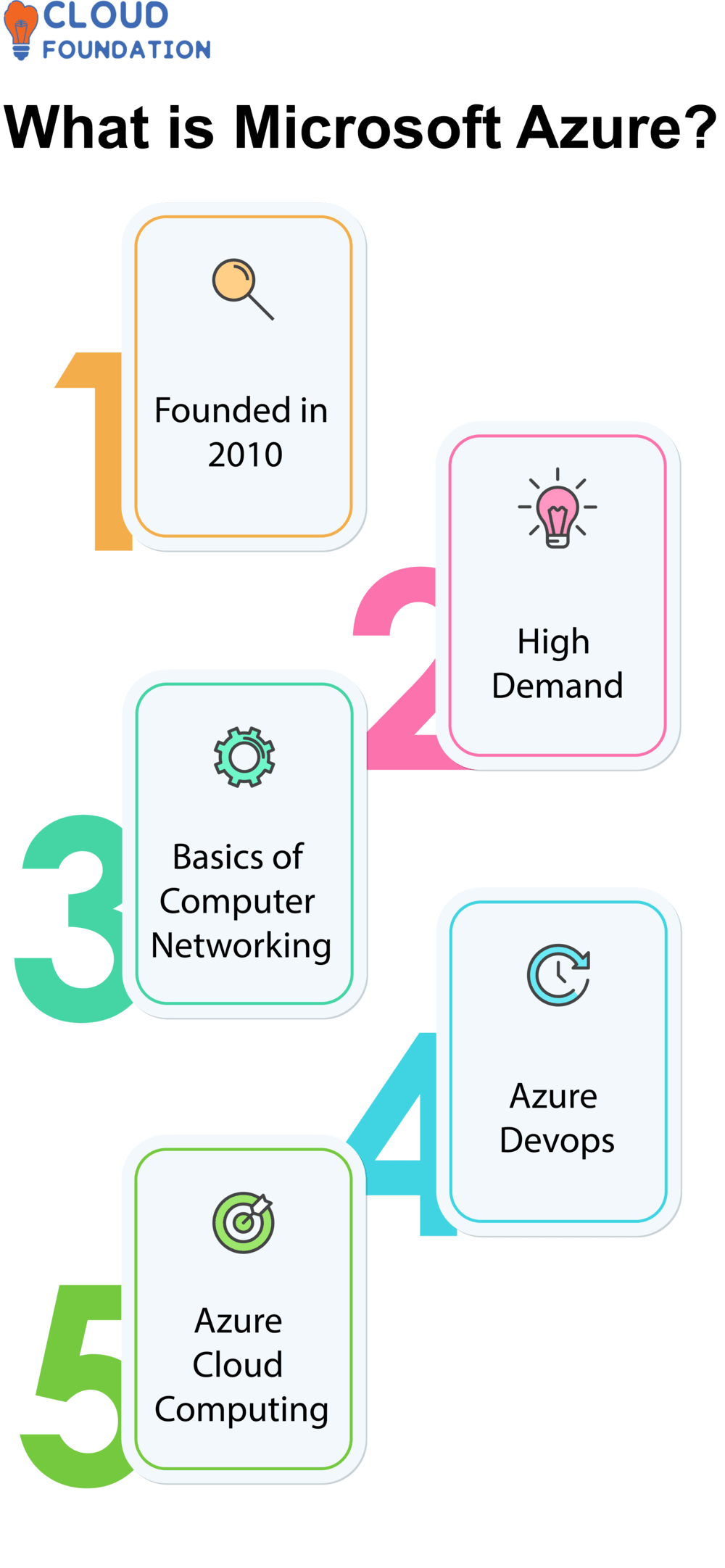
Microsoft Azure offers customers a secure global network of data centers to develop, deploy and manage applications and services. It provides virtual machines, storage, networking, databases, AI, and IoT capabilities – the works! With Azure, you get it all!
Azure provides affordable and flexible cloud computing for both startups and large organizations. Users can design, deploy, and manage applications and services using their preferred tools, frameworks, and languages.
Azure simplifies application development and deployment. The platform’s scalability, dependability, and robust capabilities enable users to focus on their applications and business requirements without worrying about managing hardware or software requirements.
Microsoft Azure has built-in security, compliance, and data protection features that ensure it satisfies safety and regulatory requirements for organizations. With Microsoft Azure, you can create, deploy and manage cloud-based applications and services from one central location.
Introduction of Microsoft Azure
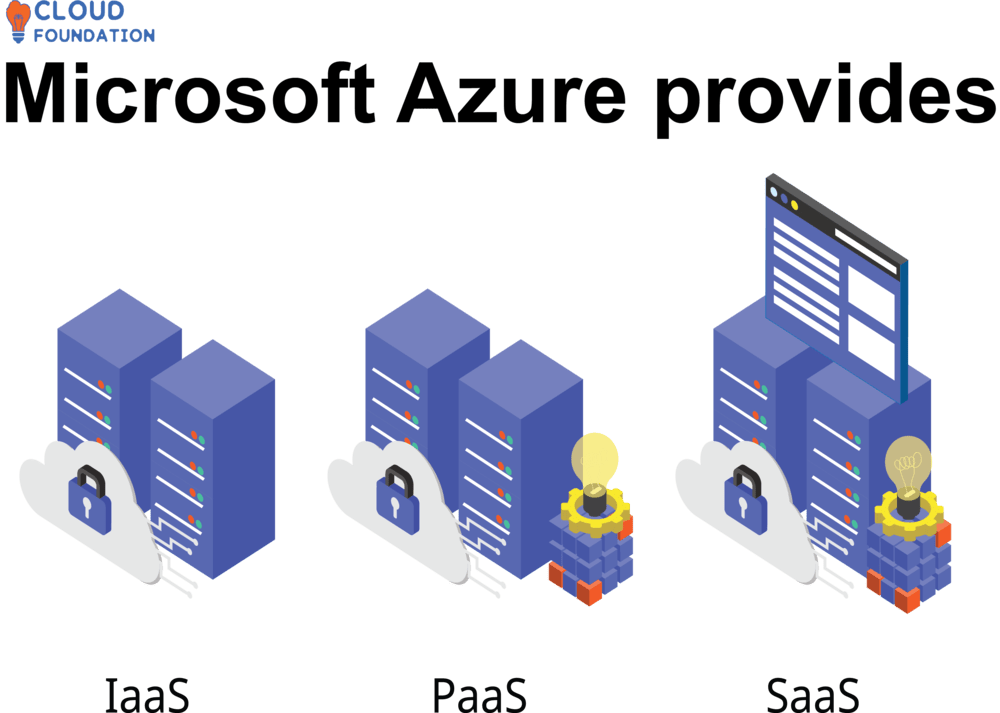
Microsoft Azure is a cloud computing platform and service that enables organisations to build, deploy, and manage applications and services from its global data centres.
Azure provides SaaS, PaaS and IaaS (Infrastructure as a Service) for organisations. Microsoft Azure makes creating, deploying and maintaining applications across numerous operating systems, mobile devices and online browsers easy.
Azure’s compatibility with many third-party applications and services enables businesses to link their systems and applications together quickly.
Azure’s key benefits include its scalability, security, and dependability. Plus, its pay-as-you-go model makes it affordable for businesses of any size to utilize its services.
Azure provides monitoring, analytics and automation to aid organisations in managing their applications and services.
Microsoft Azure Definition
Microsoft Azure is a cloud computing platform and service provided by Microsoft. With its global network of data centres, it enables organisations to design, deploy, and manage applications and services more efficiently.
Azure provides infrastructure as a service (IaaS), platform as a service (PaaS), software as a service (SaaS), as well as support for numerous third-party apps and services.
Businesses can utilize Azure to design, deploy and manage apps across a range of devices and platforms with ease – while enjoying scalability, security, stability and a pay-as-you-go pricing model.
What are Microsoft Azure cloud services?
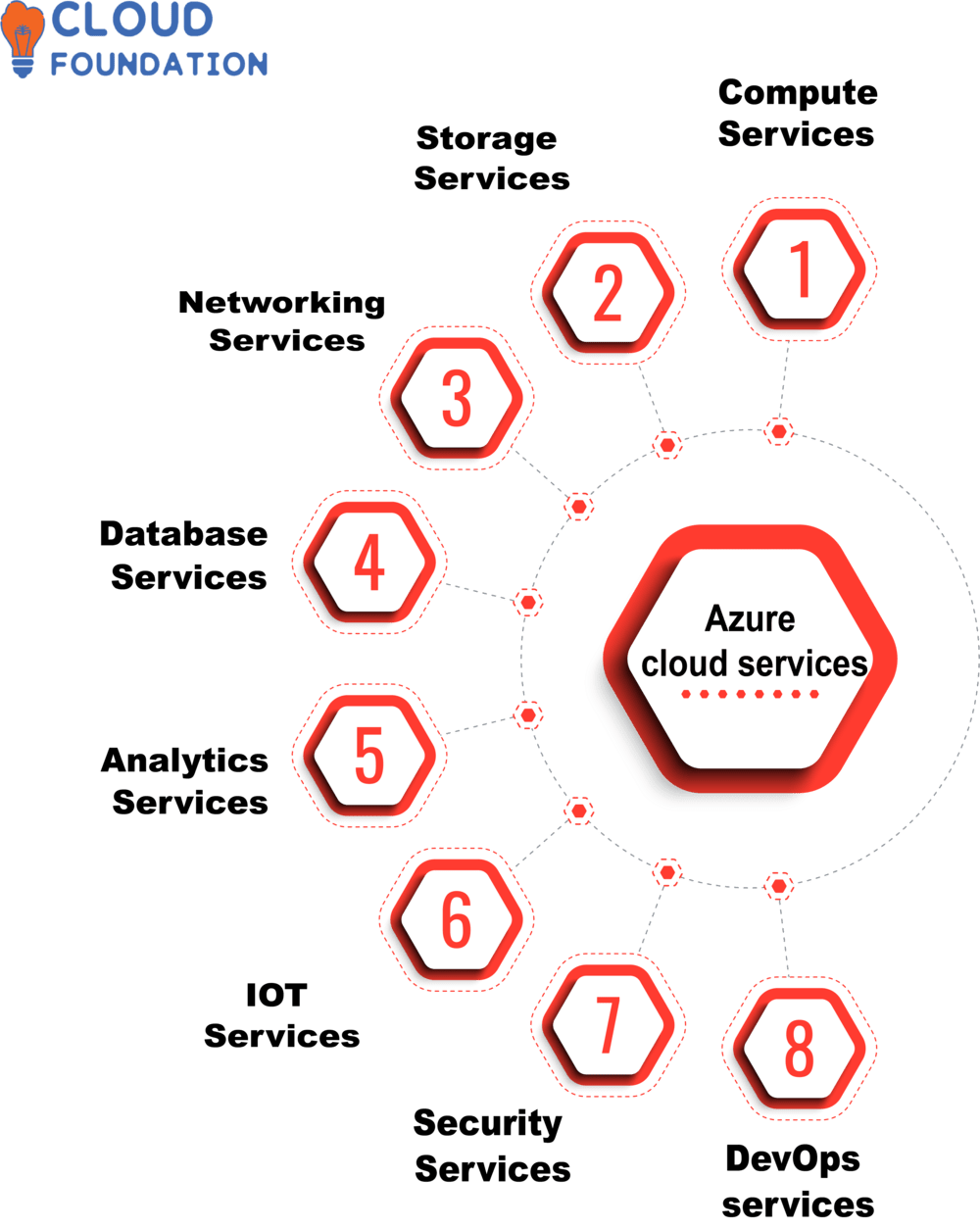
Microsoft Azure provides a vast selection of cloud services, which are classified into the following groups:
Compute Services: Azure provides virtual machines, container services and functions to deploy, manage and scale applications across different operating systems, programming languages and tools.
Storage Services: Azure provides Blob storage, File storage, Queue storage and Disk storage to store and manage data in a scalable, durable and highly available fashion.
Networking Services: Azure offers Virtual Network, Load Balancer, Application Gateway and DNS services to connect and secure applications and services across different regions, networks, and users.
Database Services: Azure provides SQL Database, Cosmos DB, and other database solutions that make managing and scaling data an effortless process that’s secure, dependable, and accessible across the globe.
Analytics Services: Azure offers services like Azure Stream Analytics, HDInsight and Machine Learning to process, analyze and visualize data in real-time, batch or streaming scenarios.
Internet of Things (IoT) Services: Azure provides IoT Hub, Event Hubs and other tools to connect, monitor and control IoT devices and applications.
Security Services: Azure provides Identity and Access Management, Security Center, as well as other services to safeguard applications, data, and infrastructure against threats and vulnerabilities.
DevOps services: Azure offers DevOps, Boards and Artifacts that make it simpler to collaborate, automate tasks and continuously release new apps and services.
Azure boasts a comprehensive set of services and features, making it the go-to cloud platform for businesses of all sizes and types.
What is Azure Active Directory?
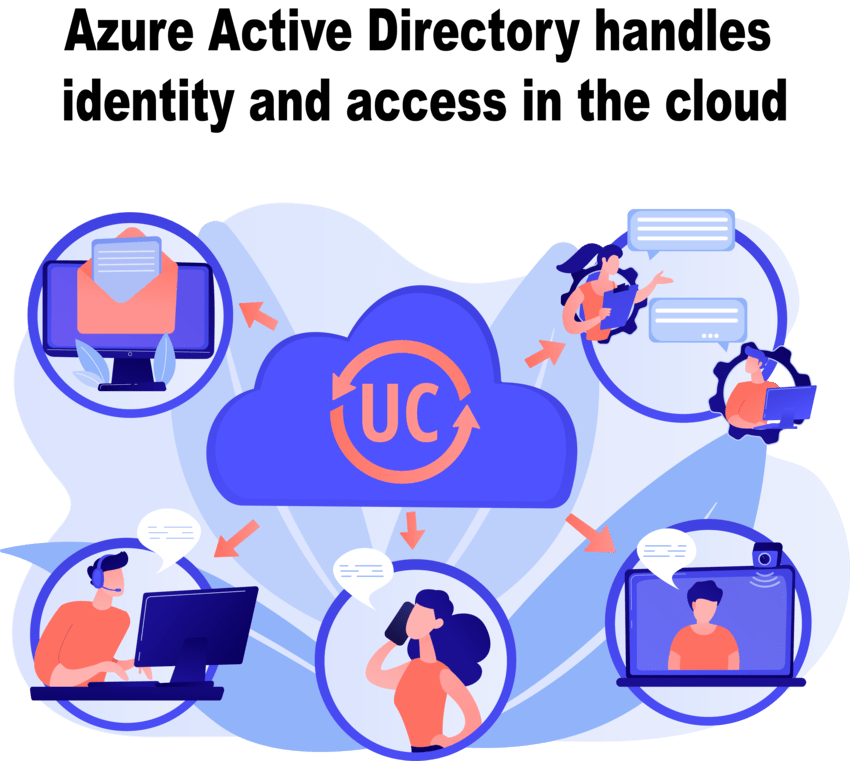
Microsoft provides Azure Active Directory (Azure AD), a cloud-based identity and access management solution.
SSO, MFA, device management, and application access control are just some of the features provided by this fully managed service for identity and access management needs.
Access to on-premises and cloud-based apps and resources can be managed and controlled centrally with Azure Active Directory. Administrators use it for setting up user accounts and groups, assigning responsibilities, implementing access controls, and more.
Microsoft 365, Salesforce, Dropbox and many more third-party applications and services can be integrated with Azure AD.
Furthermore, this provides programmers with a safe and dependable authentication framework on which to build their own creations.
Azure Active Directory (AD) is an essential element of Microsoft’s cloud infrastructure, providing enterprises with a highly available, scalable, and secure identity and access management solution.
What is Azure Cloud Computing?

Azure is a cloud computing service and platform developed by Microsoft that offers an extensive suite of cloud-based tools to assist businesses with designing, deploying, and running cloud-based software and infrastructure. With this comprehensive offering, businesses can design, deploy, and operate their infrastructure more easily than ever before.
Azure’s cloud services provide infrastructure as a service (IaaS), platform as a service (PaaS), and software as a service (SaaS), in addition to supporting many third-party apps and services.
Microsoft Azure, with its global data center cluster, offers organisations a highly available, fault-tolerant, and secure environment to host their data and applications.
Microsoft’s Hyper-V virtualization technology forms the backbone of Azure’s cloud services, guaranteeing maximum performance, security, and workload separation for individual clients.
Businesses that utilize Azure cloud services have access to a comprehensive suite of monitoring, analytics, automation and administration tools and services – with only paying for what they actually use.
Microsoft Azure Cloud is an expansive cloud computing platform and service, offering businesses a dependable, scalable, secure way to develop and manage cloud-based software and infrastructure.
What is Azure Active Directory Connect?

Microsoft Azure Active Directory Connect synchronizes on-premises and Azure Active Directory databases, bringing user accounts, groups, and other directory objects together from both sources for a centralized source of truth for user identities and access controls. With this single source of truth for user identities and access controls, the IT department can focus on what matters most: improving efficiency.
Azure AD Connect makes on-premises Active Directory synchronisation with Azure AD a breeze, offering pass-through authentication, federation, and password hashing synchronisation as viable implementation scenarios.
Azure AD Connect provides support for multiple forests and domains, automated user account provisioning and deprovisioning, directory item filtering by group membership or attribute values, as well as multi-lingual support.
Azure AD Connect is essential for organizations that wish to integrate their on-premises Active Directory with Azure AD to provide a unified identity and access management solution across their hybrid environment.
What is Azure SQL?
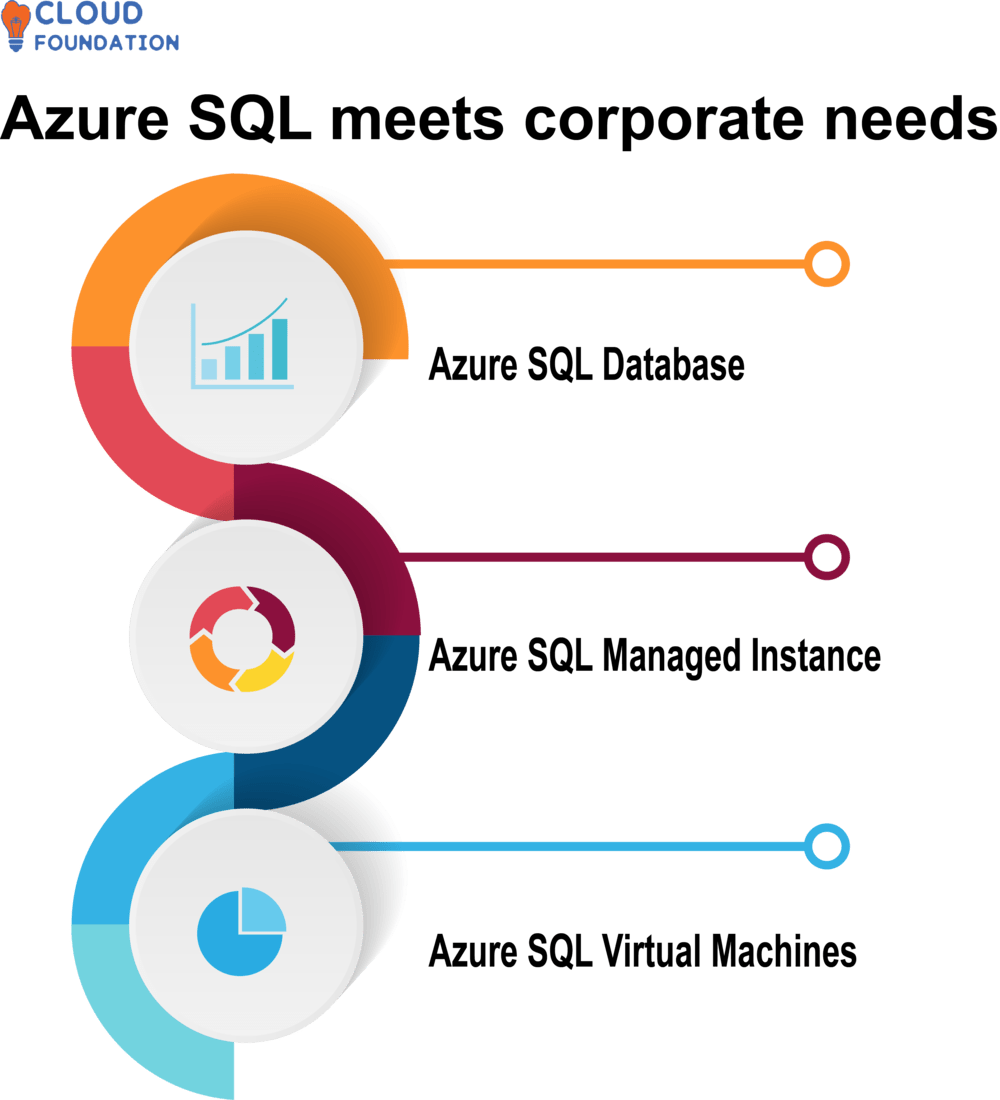
Azure SQL is a relational database service offered by Microsoft Azure. It’s fully managed, allowing enterprises to run SQL Server workloads in the cloud with built-in high availability, scalability and security features.
Azure SQL offers a range of deployment options to meet the unique requirements of enterprises, including:
Azure SQL Database is a fully managed database service that offers superior scalability, availability and performance. It includes features like automatic backups, patching and failover for added convenience.
Azure SQL Managed Instance is a fully managed instance of SQL Server that offers businesses who require to move their SQL Server workloads from on-premise servers into the cloud an easier transition.
Azure SQL Virtual Machines are a service that enables businesses to run SQL Server workloads on virtual machines in the cloud, giving them more control over their environment and supporting legacy apps and custom configurations.
Azure SQL boasts an array of features and capabilities, such as support for various programming languages and frameworks like.NET, Java, Node.js, and Python; in addition to sophisticated security measures like transparent data encryption, dynamic data masking, and always encrypted storage.
Azure SQL is a comprehensive cloud-based relational database service that offers enterprises an adaptable and scalable platform to execute SQL Server workloads in the cloud, complete with built-in capabilities for high availability, performance, and security.
What is Azure stack?
Microsoft’s Azure Stack is a hybrid cloud computing platform that brings Azure services on-premises to companies’ own servers.
Organisations can benefit from the cloud’s scalability, adaptability and creativity without giving up control of their data or infrastructure by offering a uniform cloud computing experience across public and private cloud environments.
Azure Stack provides comprehensive compute, storage, networking and security services as well as a suite of administration and monitoring tools for hybrid environments that can be installed locally.
Some of the many advantages provided by Azure Stack to organizations include:
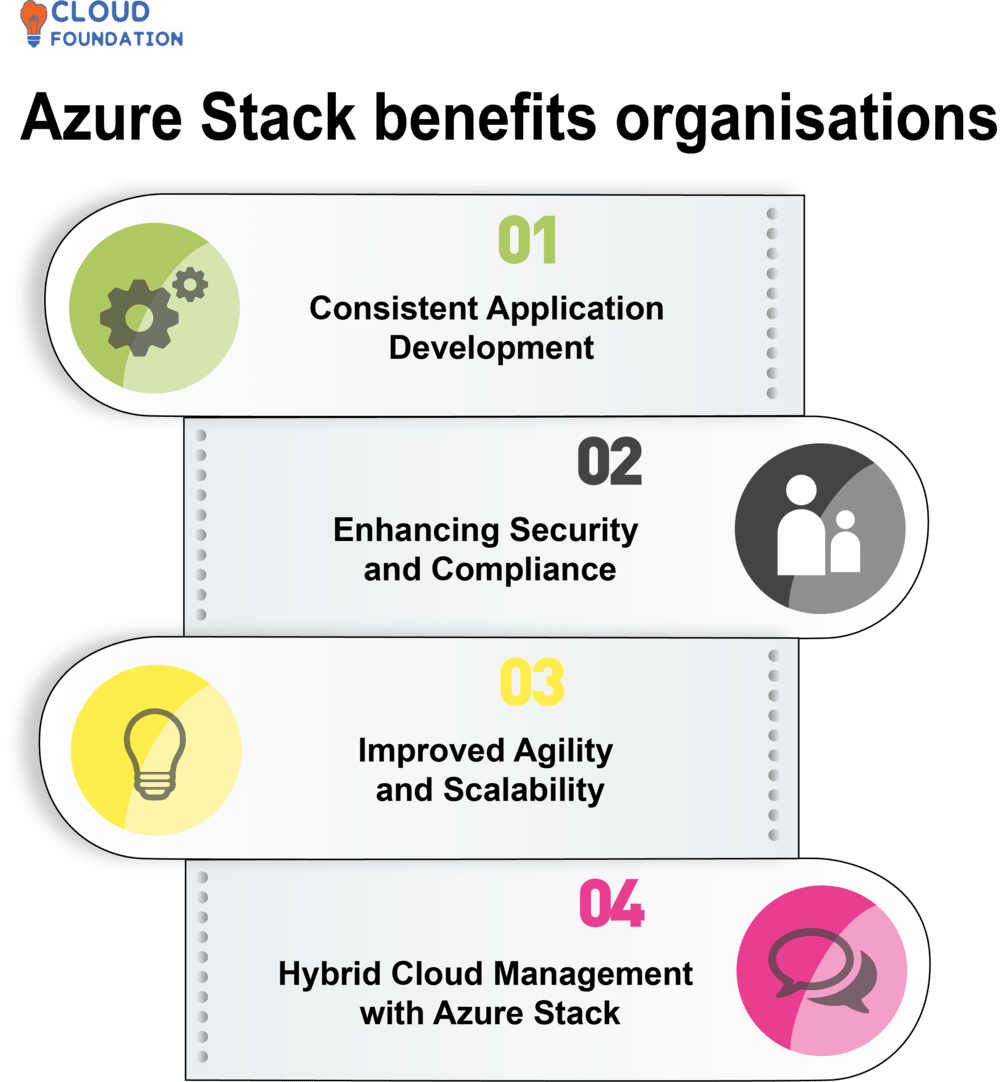
Consistent Application Development: Businesses can easily create applications that run identically in both public and private cloud environments.
Enhancing Security and Compliance: Azure Stack helps organizations maintain control over their data and infrastructure, improving security and compliance measures.
Improved Agility and Scalability: Azure Stack brings the flexibility and scalability of the cloud on-premises, enabling organisations to rapidly construct and expand their apps and services.
Hybrid Cloud Management with Azure Stack: Businesses can efficiently manage their hybrid cloud environment with Azure Stack, as it provides a unified administration experience across public and private cloud platforms.
Azure Stack, a robust and adaptable hybrid cloud computing platform, enables organizations to take advantage of the cloud’s scalability, agility, innovation while maintaining control over their data and infrastructure.
What is the use case for Azure Devops?

Azure DevOps provides several tools that enable teams to work more efficiently and effectively, including:
Backlog management, sprint planning, and work item tracking are just a few of the Agile Planning project management capabilities included in Azure DevOps that help teams prioritize tasks and organize their workloads.
Azure DevOps’ Continuous Integration and Delivery capabilities are enabled by its suite of tools for automating software development and deployment.
Automated Testing and Code Analysis are just two examples of the testing and quality assurance capabilities built into Azure DevOps that help teams guarantee the best products.
Wikis, dashboards and code reviews are just a few of the Collaboration and Communication features included in Azure DevOps that enable teams to work more efficiently and productively together.
Teams have access to Continuous Monitoring and Feedback tools built-in, so they can quickly resolve issues and iteratively improve their apps based on user input.
What is Azure Kubernetes service?
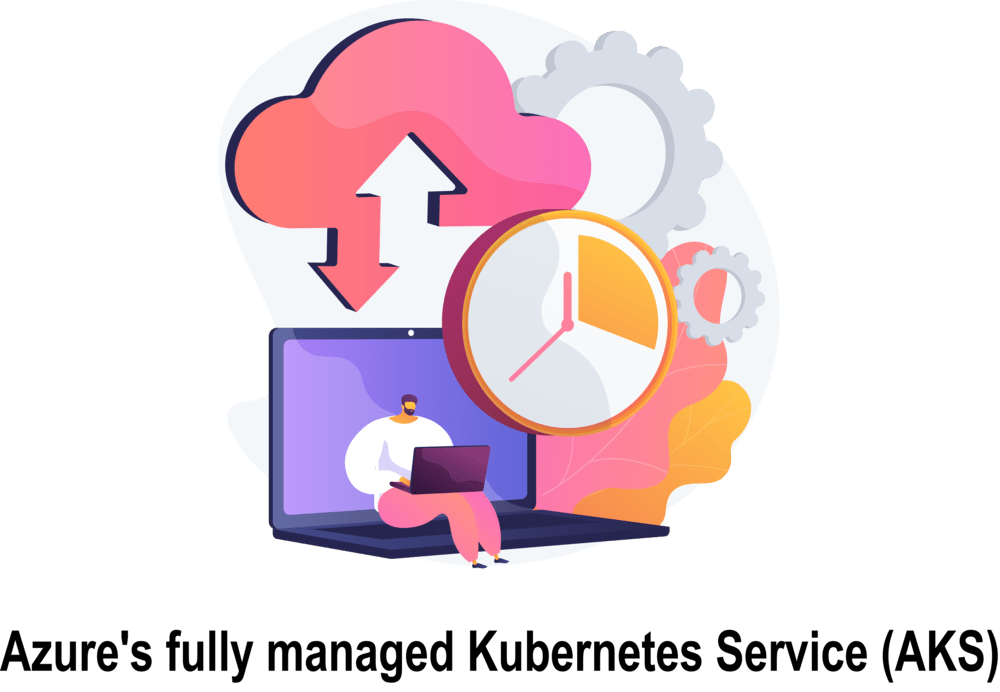
Microsoft Azure’s fully managed Azure Kubernetes Service (AKS) enables organisations to construct, expand, and manage containerized apps.
AKS simplifies deployment and management by providing a secure, scalable, and accessible containerized application environment.
AKS makes containerized application deployment and management a breeze with auto-upgrades, self-healing capabilities, and horizontal scalability. Azure Container Registry and Azure Active Directory take care of containers for you.
AKS creates and manages containerized applications for e-commerce, casino, and financial firms. This service enables software developers and testers to rapidly deploy and expand apps.
Azure Kubernetes Service offers companies a scalable, highly available, and secure container environment for containerized application deployment and management.
What is Azure Data Engineer?

Microsoft Azure data engineers design and deploy data solutions. They build pipelines for processing and storing information using Azure services, as well as managing large datasets.
Data engineers are becoming more essential as organizations increasingly value data. Data engineers design and implement data solutions using Azure Data Factory, Databricks, HDInsight, and SQL Database.
Azure data engineers collaborate with data scientists, business analysts, and other stakeholders to comprehend business needs and devise solutions.
Through their work, organisations are able to manage and analyse vast amounts of information, gain insights, and make informed decisions.
The demand for skilled Azure data engineers is expected to increase as company data becomes increasingly crucial.
What is Azure Machine Learning Studio?

Microsoft Azure Machine Learning Studio enables enterprises to design, train, and deploy machine learning models. With its advanced tools and services, businesses can more easily construct and deploy data-driven models.
Azure Machine Learning Studio offers a drag-and-drop model builder, data preparation and visualisation tools, as well as integration with Python and R. This enables organizations to construct customized models using pre-built and unique machine learning algorithms.
Businesses can quickly design and train machine learning models using Azure Machine Learning Studio. Users may deploy their models to either the cloud or edge devices for convenient scaling and management in production.
Healthcare, banking and e-commerce firms may benefit from Azure Machine Learning Studio to gain insights from large datasets. It enables marketing and advertising firms to create custom models.
Azure Machine Learning Studio is an innovative platform that enables organisations to rapidly design and deploy machine learning models, helping them gain insights from data to make informed business decisions.
What does Microsoft Azure do and what is Microsoft Azure used for?
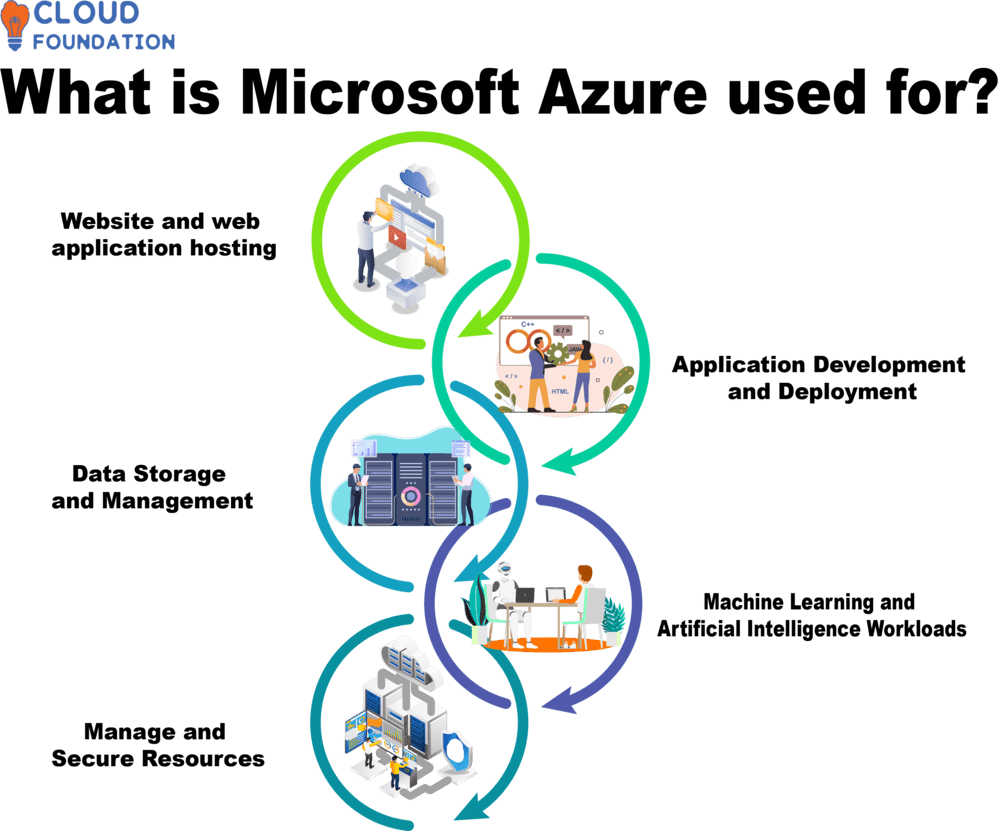
Microsoft provides its Azure cloud computing platform to assist customers in creating, deploying and managing cloud-based software and services. Through this platform, customers can access cloud resources such as computation, storage, database, analytics, networking and more – all through one centralized location.
Website and web application hosting: Azure provides a platform for hosting websites and web applications, as well as tools for deploying and managing them.
Application Development and Deployment: Azure provides a range of tools and services for creating, testing, and deploying applications – including virtual machines, containers, and serverless computing.
Data Storage and Management: Azure offers a variety of storage solutions, such as relational and non-relational databases, along with tools for data management and analysis.
Machine Learning and Artificial Intelligence Workloads: Azure provides tools and services for executing machine learning and artificial intelligence projects, including model training and deployment.
Manage and Secure Resources: Azure provides tools and services for managing and protecting cloud resources, such as identity & access management, security monitoring, and compliance reporting.
How does Microsoft Azure work?

Microsoft Azure provides cloud-based software and services for clients to design, deploy, and manage. It leverages Microsoft’s global data centre network to host a wide range of services and applications.
Azure provides a host of services that enable users to run programs and services without worrying about hardware or network configuration. Azure’s extensive offerings allow for the creation and execution of diverse apps.
The platform offers advanced capabilities in computation, storage, database, networking, security and identification. With its versatility and scalability, it caters to enterprises with evolving requirements.
Azure’s pay-as-you-go model only charges for resources used, allowing enterprises of all sizes to save money. Microsoft Azure is an incredibly powerful cloud computing platform that enables users to quickly, securely, and scalable launch their applications and services.
Why Microsoft Azure and what are the benefits of Microsoft Azure?
Organizations have numerous reasons to utilize Microsoft Azure, a cloud computing platform. One major advantage is Microsoft Azure’s scalability – an essential feature when scaling up operations.
Businesses can quickly adjust to fluctuations in demand without worrying about maintaining their own hardware thanks to Azure’s scalability options.

Furthermore, Azure’s pay-as-you-go model makes it affordable for companies of any size. Businesses can protect their apps and services from cybercriminals using Azure’s suite of security and identity services.
Azure is compatible with a wide range of platforms, software, and hardware, making it simple for organisations to integrate it into their current processes.
Microsoft Azure cloud platform offers a feature-rich environment in which enterprises can design, deploy and manage applications and services securely and scalable.
Advantages of Microsoft Azure

Businesses looking into cloud computing technology have a lot to gain by using Microsoft Azure. Some of its most notable benefits are as follows:
Scalability: Azure makes it simple for companies to scale or shrink their infrastructure according to their demands, enabling them to adjust quickly in response to changes in demand without needing to manage their own hardware. This gives them the freedom to change quickly without worrying about managing additional resources.
Cost-Effective: Azure’s pay-as-you-go pricing model ensures businesses only pay for the resources they consume, making it a cost-effective solution suitable for businesses of all sizes due to its affordability and ability to save money.
Security: Azure offers a suite of security and identity services that businesses can leverage to keep their apps and services safe from threats. These include managing identities and access, encrypting data, as well as keeping an eye on security.
Reliability: Azure boasts a global network of data centres spread out around the globe, providing businesses with high levels of availability and redundancy even during outages.
Integration: Azure seamlessly integrates with a variety of tools and technologies, such as popular programming languages, development tools, and services from other companies. This makes it simple for businesses to incorporate Azure into their current operations.
AI and Machine Learning: Azure provides a suite of services and tools for creating, testing, and deploying workloads that incorporate AI and machine learning. This makes it possible for businesses to leverage AI technology to enhance their products and services.
What is Microsoft Azure software and how to use Microsoft Azure?

Microsoft Azure is a cloud computing platform that provides various services to enable individuals and organisations to design, deploy, and maintain applications and services through its global network of data centres.
Microsoft Azure provides a range of services to its customers, which can be accessed via the Azure tool website. These include virtual machines, storage, databases, analytics and machine learning – all accessible on one convenient platform!
Before using Azure, those new to the platform must create an account with Microsoft Azure basics and subscribe to all necessary services.
Once a customer has subscribed to Azure, they will gain access to the Azure portal – a web-based platform offering an intuitive graphical user interface for managing and monitoring their services.
Customers have the choice to access Azure services through application programming interfaces (APIs), command line tools or development suites such as Visual Studio.
Microsoft Azure Modules
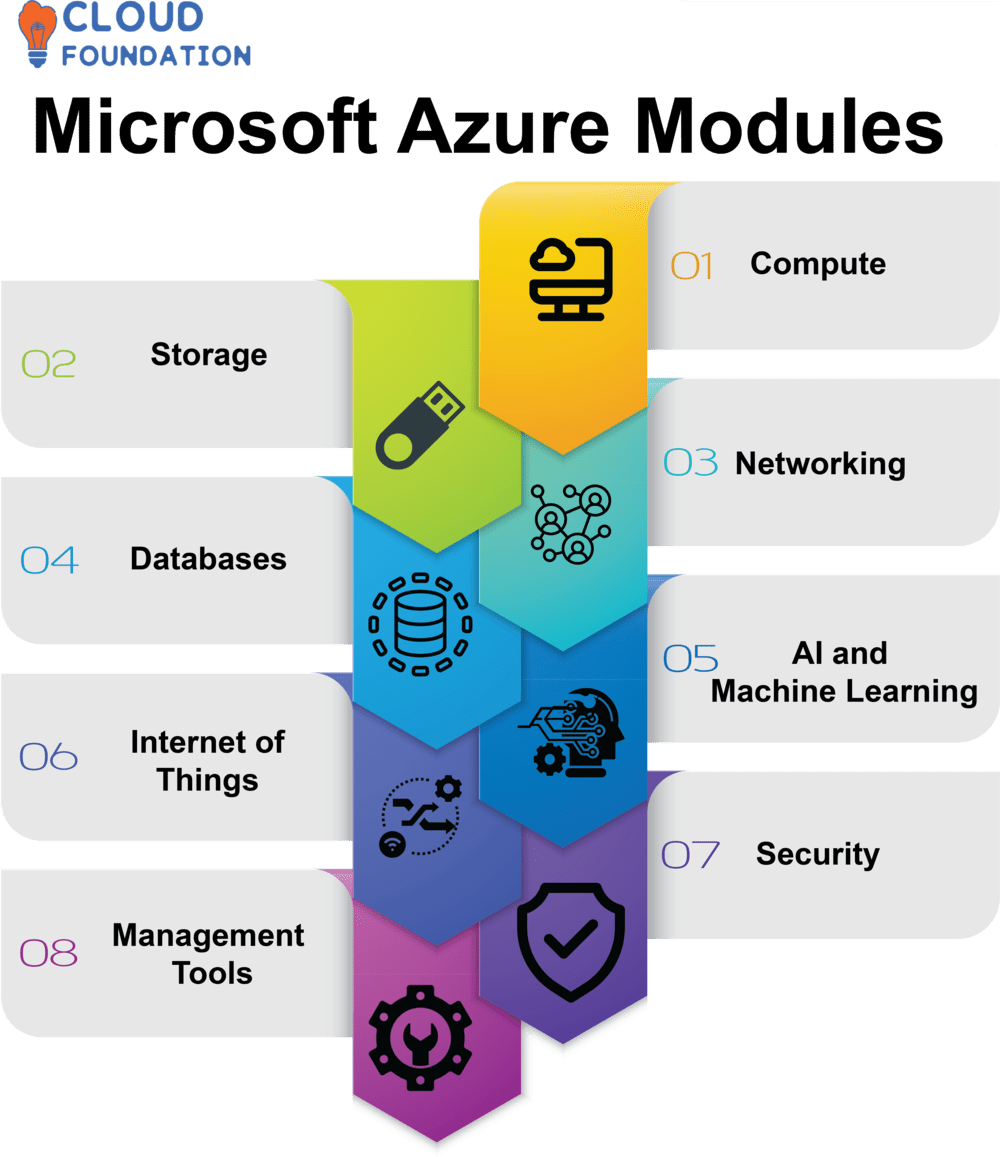
Microsoft Azure offers an impressive selection of modules and services to assist developers, businesses, and others in creating, deploying, and managing cloud-based apps and services. Some of Microsoft Azure’s most popular modules and services include:
Compute: This module offers services for running virtual machines, container instances and serverless computing functions.
Storage: It provides capabilities for storing and accessing blobs, files, discs and queues of data as well as other types of objects.
Networking: This module offers services for creating virtual networks, load balancers and traffic managers to manage traffic to and from applications.
Databases: This module offers management and scaling capabilities for SQL, NoSQL, in-memory databases as well as other types of databases.
AI and Machine Learning: This module provides services for creating and deploying intelligent applications and models, such as cognitive services, bot services, and machine learning models.
Internet of Things (IoT): This module includes IoT hubs, Central, and Edge–services for building and managing IoT solutions.
Security: This module offers solutions for securing identity access, protecting against threats, and ensuring rules are followed.
Management Tools: This module includes services like Azure Monitor, Azure Advisor and Azure Resource Manager to manage and keep an eye on Azure resources and apps.
What are the Best Ways to Learn Microsoft Azure?

Studying Microsoft Azure can be an excellent career move for those wanting to hone their cloud computing expertise.
The Azure blog documentation is an ideal starting point to learning about Azure. It covers topics from beginner to intermediate level with comprehensive explanations and videos on various topics related to the cloud platform.
CloudFoundation’s online learning platform offers engaging and hands-on Microsoft Azure learning experiences. It includes courses, labs, and exercises on a wide variety of Azure services and concepts. If you have any questions or concerns, you may reach out to the company’s technical support team at any time.
Earn certifications that provide a structured learning path and validate your Azure knowledge and abilities. Choose from Azure Administrator, Developer, Solutions Architect or more – there’s something for everyone.
CloudFoundation offers Microsoft Azure courses and Azure training videos. These Azure course provide a comprehensive overview of Azure principles and services; some even grant certification upon completion.

Saniya
Author
“Life Is An Experiment In Which You May Fail Or Succeed. Explore More, Expect Least.”



